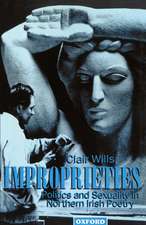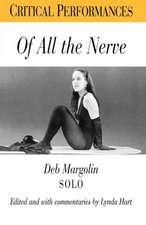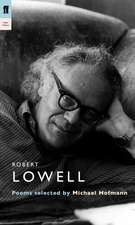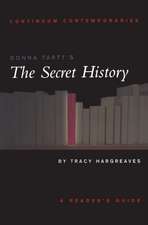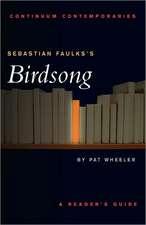Truthful Fictions: Conversations with American Biographical Novelists
Editat de Professor Michael Lackeyen Limba Engleză Paperback – 23 apr 2014
| Toate formatele și edițiile | Preț | Express |
|---|---|---|
| Paperback (1) | 191.85 lei 6-8 săpt. | |
| Bloomsbury Publishing – 23 apr 2014 | 191.85 lei 6-8 săpt. | |
| Hardback (1) | 831.43 lei 6-8 săpt. | |
| Bloomsbury Publishing – 23 apr 2014 | 831.43 lei 6-8 săpt. |
Preț: 191.85 lei
Preț vechi: 222.87 lei
-14% Nou
Puncte Express: 288
Preț estimativ în valută:
36.72€ • 38.19$ • 30.31£
36.72€ • 38.19$ • 30.31£
Carte tipărită la comandă
Livrare economică 14-28 aprilie
Preluare comenzi: 021 569.72.76
Specificații
ISBN-13: 9781623568252
ISBN-10: 1623568250
Pagini: 280
Dimensiuni: 140 x 216 x 20 mm
Greutate: 0.36 kg
Editura: Bloomsbury Publishing
Colecția Bloomsbury Academic
Locul publicării:New York, United States
ISBN-10: 1623568250
Pagini: 280
Dimensiuni: 140 x 216 x 20 mm
Greutate: 0.36 kg
Editura: Bloomsbury Publishing
Colecția Bloomsbury Academic
Locul publicării:New York, United States
Caracteristici
Provides insight into the context and aesthetic theories underwriting the work of prominent novelists
Notă biografică
Michael Lackey is Distinguished McKnight University Professor of English at the University of Minnesota, USA. He is the author of The Modernist God State: A Literary Study of the Nazis' Christian Reich (2012), and African American Atheists and Political Liberation: A Study of the Socio-Cultural Dynamics of Faith, which won the Choice Award for Outstanding Academic Title in 2008. He is also the editor of The Haverford Discussions: A Black Integrationist Manifesto for Racial Justice (2013).
Cuprins
ContentsAcknowledgments Introduction: The Rise of the American Biographical Novel, Michael LackeyInterviews:1. Julia Alvarez: Fixed Facts and Creative Freedom in the Biographical Novel2. Russell Banks: The Truth Contract in the Biographical Novel3. Madison Smartt Bell: Big Revolutionary Bangs in the Biographical Novel4. M. Allen Cunningham: Building the Imaginative Record with the Biographical Novel5. Michael Cunningham: The Biographical Novel and the Complexity of Postmodern Interiors6. Anita Diamant: Imagining a Matrilineal History in the Biographical Novel7. Bruce Duffy: In the Fog of the Biographical Novel's History8. Ron Hansen: Sensualizing and Contextualizing Historical 'Truth' in the Biographical Novel9. Sherry Jones: The Art of Claiming Power in the Biographical Novel10. Rebecca Kanner: Feminist Naming in the Biographical Novel11. Kate Moses: Re-Composing a Life in the Biographical Novel12. Joyce Carol Oates: Enhanced Symbolic Interiors in the Biographical Novel13. Lance Olsen: The Biographical Novel's Practice of Not-Knowing14. Jay Parini: Reflections on Biographical Fiction15. Joanna Scott: The Masking Art of the Biographical Novel16. Edmund White: Gay Interiors and the Biographical NovelContributorsBibliographyIndex
Recenzii
In this absorbing collection of interviews, University of Minnesota professor Michael Lackey and his accomplished subjects raise complex questions about how history and fiction intersect, and how the novelist blends the two to probe larger emotional and historical truths. In trying to answer why the genre of biographical fiction has grown since the 1980s, Lackey asked 16 writers (including Anita Diamant, Michael Cunningham, Russell Banks, and Joyce Carol Oates) to explain their projects and process. The result is a vibrant discussion about the differences between biographical fiction and history, and the nature of the novel form-what liberties it allows, what boundaries it should not cross. Readers are privy to the writing process: research conducted, choices made, inspirations found. Although Lackey and some of his subjects raise the idea of postmodernism and the rise of psychology as reasons for the emergence of the biographical novel, the book is not heavy on theory, nor is it necessary to have read all the books discussed. This collection will appeal to readers interested in why literature matters and how the past shines light on our present, our future, and our humanity.
Lackey travels the United States to interview 16 practitioners of biographical novelization, such as Joyce Carol Oates, Edmund White, and Julia Alvarez as well as less widely read writers as Lance Olsen and Rebecca Kanner. The interview format conveys the thoughtful intelligence and insights of these authors ... This book is useful for readers seeking recommendations of the best American (and some British) biographical fiction ... Also of interest to those who like to read writer interviews.
A multi-voiced exploration of what contemporary readers value and desire, the complex and elusive processes of writing a compelling work of fiction, and the relationship between historical events and present-day society ... This book will reward readers who are curious about the individual authors and novels discussed.
Michael Lackey's probing questions prompt illuminating responses from some of America's most prominent contemporary authors who have contributed to the popularity of biographical novels. These interviews give us full access to the authors' complex, multifarious, and tortuous creative processes, offering insights into the challenges they faced and their writing strategies when negotiating fact and fiction.
In this compelling collection of dialogues, many of our most thoughtful writers peer into the fog-bound realm of historical fiction, where wisps of fact are conjured into billowing clouds of meaning. With candor, wit, and penetrating insights, these fine magicians show that their conjurations are somehow real.
Lackey travels the United States to interview 16 practitioners of biographical novelization, such as Joyce Carol Oates, Edmund White, and Julia Alvarez as well as less widely read writers as Lance Olsen and Rebecca Kanner. The interview format conveys the thoughtful intelligence and insights of these authors ... This book is useful for readers seeking recommendations of the best American (and some British) biographical fiction ... Also of interest to those who like to read writer interviews.
A multi-voiced exploration of what contemporary readers value and desire, the complex and elusive processes of writing a compelling work of fiction, and the relationship between historical events and present-day society ... This book will reward readers who are curious about the individual authors and novels discussed.
Michael Lackey's probing questions prompt illuminating responses from some of America's most prominent contemporary authors who have contributed to the popularity of biographical novels. These interviews give us full access to the authors' complex, multifarious, and tortuous creative processes, offering insights into the challenges they faced and their writing strategies when negotiating fact and fiction.
In this compelling collection of dialogues, many of our most thoughtful writers peer into the fog-bound realm of historical fiction, where wisps of fact are conjured into billowing clouds of meaning. With candor, wit, and penetrating insights, these fine magicians show that their conjurations are somehow real.

